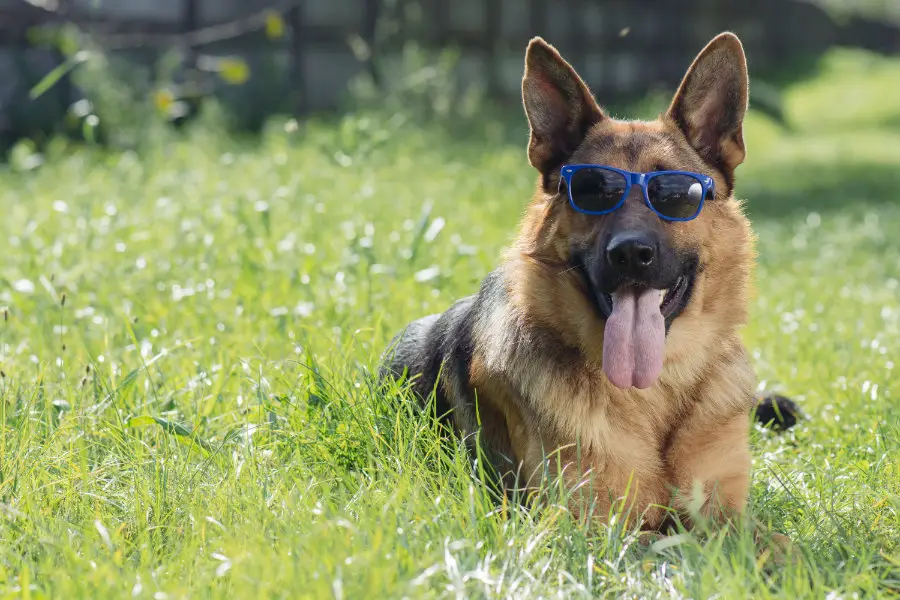There are many different components that make up the general care of a dog. Not only does this refer to the amount of direct interaction they require, but you also must account for the time that goes into grooming, training, exercise, and healthcare, among others. So, are German Shepherds low-maintenance dogs?
German Shepherds are not low-maintenance dogs. They require regular mental and physical stimulation, attention to healthcare, grooming and ongoing training. Training German Shepherds early on, providing them with goal-oriented tasks, and taking the time to earn their trust will reduce their maintenance overall.
There is no single aspect that determines how much maintenance goes into a dog’s care. Rather, a variety of aspects go into the overall wellbeing of an animal. Keep reading to find out more about how exercise, temperament, age, training, grooming, and health determine the relatively high-maintenance of German Shepherds.

Factors In The Care Of German Shepherds
Several factors determine the degree of maintenance any given dog requires. Here is a closer look at the care needed for German Shepherds.
Exercise
German Shepherds are working dogs. Even dating back to the World War I era, individuals of this breed were performing a number of tasks to aid in the war effort. They transported materials, acted as messengers, rescuers, and guards. It’s always been clear that German Shepherds are goal-driven.
For you, this means that not only do these Shepherds need regular exercise, but they also require mental stimulation. Task-oriented play is the best way to physically and mentally work out your German Shepherd.
Activities like agility, herding, and tracking are great ways to keep your dog in peak shape, and they will be much more satisfying than simply taking them for walks. Be sure both their brain and body are getting the exercise they need.
Temperament
German Shepherds are known for being a remarkably intelligent breed. These dogs need stimulation, or else they tend to act out. If German Shepherds aren’t trained to rein in their impulses, they may act out in negative ways. Potential undesirable behavior that an under-stimulated, impulsive German Shepherd may exhibit includes:
- Digging
- Destructive chewing
- Chasing objects such as moving vehicles or other animals
- Excessive barking
Although, dogs of this breed are unwaveringly loyal to those they love and trust. With this in mind, they may be wary of those who are strangers to them. Don’t take it personally if a German Shepherd doesn’t love you right off the bat. They are often aloof at first as their guard is up, determining if someone is safe and trustworthy.
The more a German Shepherd gets to know you, the more you can earn their trust. While it may take time to develop a good friendship with them, they are fiercely loyal animals. Socializing them early on with humans and other dogs will make this easier.
Age
The age of a German Shepherd plays a big role in determining how involved their care must be. Of course, puppies require much more attention than adult dogs as they are just figuring out the world and have yet to learn right from wrong.
All the puppy energy in a young German Shepherd makes them more prone to getting into trouble. They may exhibit destructive chewing, be more naturally prone to chasing, and overall act out impulsively. More attention must be directed to your dog when they are young to keep them safe and behaving properly.
A dog’s youth is a crucial time for training. It’s much easier to teach them right from wrong when a puppy is young, so investing the time into training now is going to be beneficial in the long run.

Training
The earlier you begin training your German Shepherd, the lower maintenance they will be in the future. If you can nip bad habits like destructive chewing in the bud while they’re still young, you’ll have less trouble to deal with as they get older.
Similarly, it’s important to establish your dominance as soon as possible. While it might be hard to tell your adorable young pup, “No,” it is necessary. It’s easy to let them get away with anything, but if you coddle your German Shepherd too much, you may have a harder time getting them to listen to you.
Luckily, due to their incredible intellect, this breed is easy to train. That being said, their smarts can easily lead them to boredom, so constant training will help exercise their brains and prevent inappropriate behavior. Using positive reinforcement techniques like praise and treats will be the best way for these dogs to learn.
Grooming
Adopting a German Shepherd is one way to ensure you stay up to date on cleaning your house. These dogs are fairly heavy shedders and love giving your vacuum a workout.
Regularly brushing your German Shepherd will help get rid of the loose hairs in their coat. This can help localize shedding instead of letting it fall everywhere. However, they do shed one to two times a year, usually in time with the change of seasons. Prepare to be cleaning dog hair during these periods.
German Shepherds, however, do not require baths regularly. Unless they find themselves rolling around in a puddle of mud, an occasional wash down should do the trick.
As with all dogs, their nails should be clipped every month. This is easy to do at home using a trimmer like the I-Pure Dog Nail Grinder that comes with various settings for different sized dogs. This machine’s technology makes the process quiet and safe, so there is less risk of inducing anxiety in your German Shepherd or causing a painful over-clipped nail.
Of course, if your German Shepherd gives you a hard time or you are nervous doing it at home, a groomer can always do this job for you.
Health
If adopted from a reputable breeder, the parents of a German Shepherd should be screened for a multitude of health conditions that these dogs are prone to. However, if this is not done properly, some ailments your dog may face include:
- Elbow and hip dysplasia
- Degenerative myelopathy
- Renal cystadenocarcinoma and nodular dermatofibrosis
Due to the size and activity levels of German Shepherds, they may also suffer from the sudden and potentially fatal condition known as bloat, or gastric dilation-volvulus. Some veterinarians may perform surgery to aid in the prevention of bloat. However, there is no guarantee the dog will not develop it.
Keeping a close eye out for symptoms of bloat can potentially save a German Shepherd’s life.
Final Thoughts
The care of a German Shepherd can be fairly involved as they require regular mental and physical exercise, ongoing training, brushing, and attention to their health levels. When the needs of these dogs are not being met, they can act in undesirable ways, such as exhibiting destructive chewing, impulsiveness or chasing.
However, German Shepherds are highly intelligent animals that are goal-oriented and love to work. So, if provided with sufficient stimulation and given basic training early on, these dogs will be satisfied. Once putting the time into earning their trust, German Shepherds will also be fiercely loyal, and you will have a dependable companion for life.
Ultimately, like humans, all dogs should be cared for and have needs that must be met. No breed will require zero maintenance, but if you love your German Shepherd, caring for them will not be a chore.
